Spotify
Spotify is a capitalist company that go a long way to make a profit for their top shareholders while diminishing returns for the people who create what Spotify sell: the artists. There are much better music-streaming platforms.
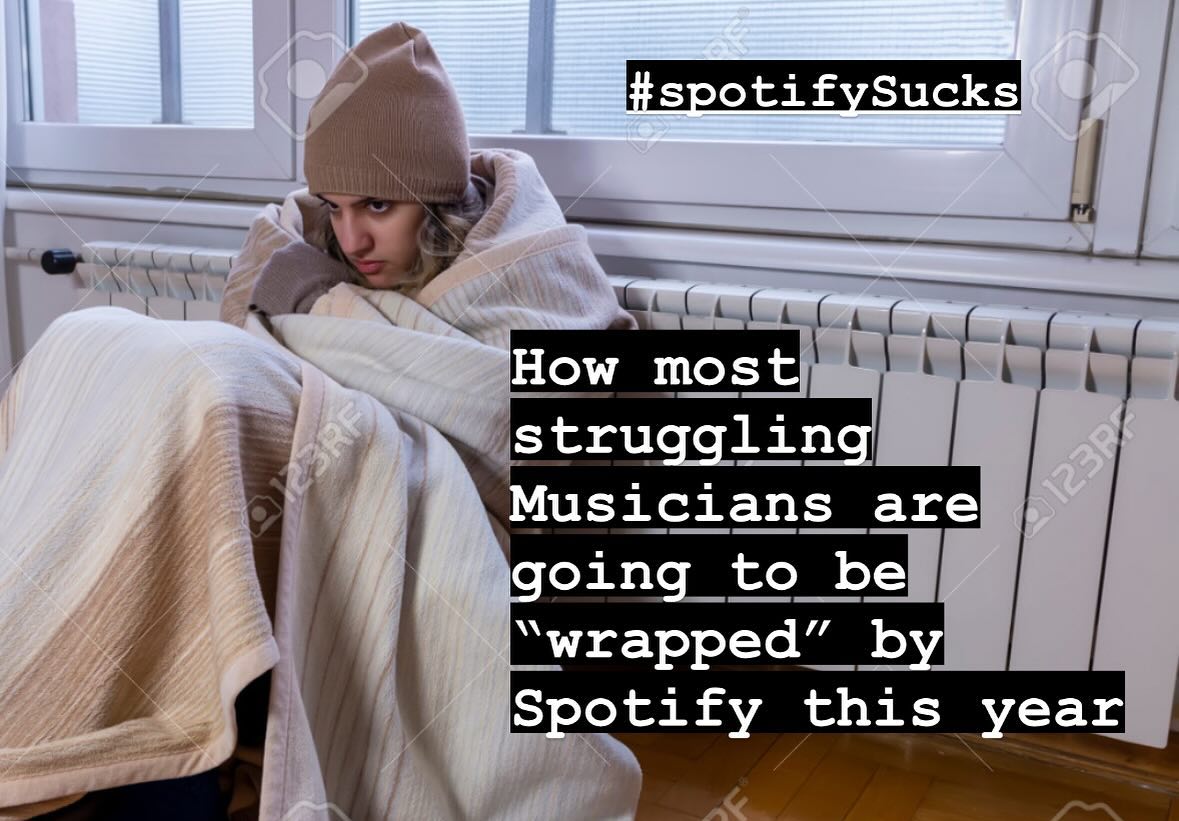
Because I lack time to update the list below, please instead see my Spotify news collection, where I'm constantly adding Spotify-and-Daniel-Ek-related news. In other words, the news collection is updated far more often than the one below; the one below is kept for historical purposes.
There's always going to be problems when combining money and music, but when companies like Spotify don't just try and come up with new ways to make a profit but simultaneously try to minimise artist income[1] but also commits other shady acts, like shutting out an entire country when that country makes laws to protect artists[2], you know you're dealing with a shitty company.
Spotify takes your data - a lot of data - and sells that data[3].
If Spotify were a person, would you be friends? Not likely.
How were things with Spotify in 2024?
From United Musicians and Allied Workers (UMAW):
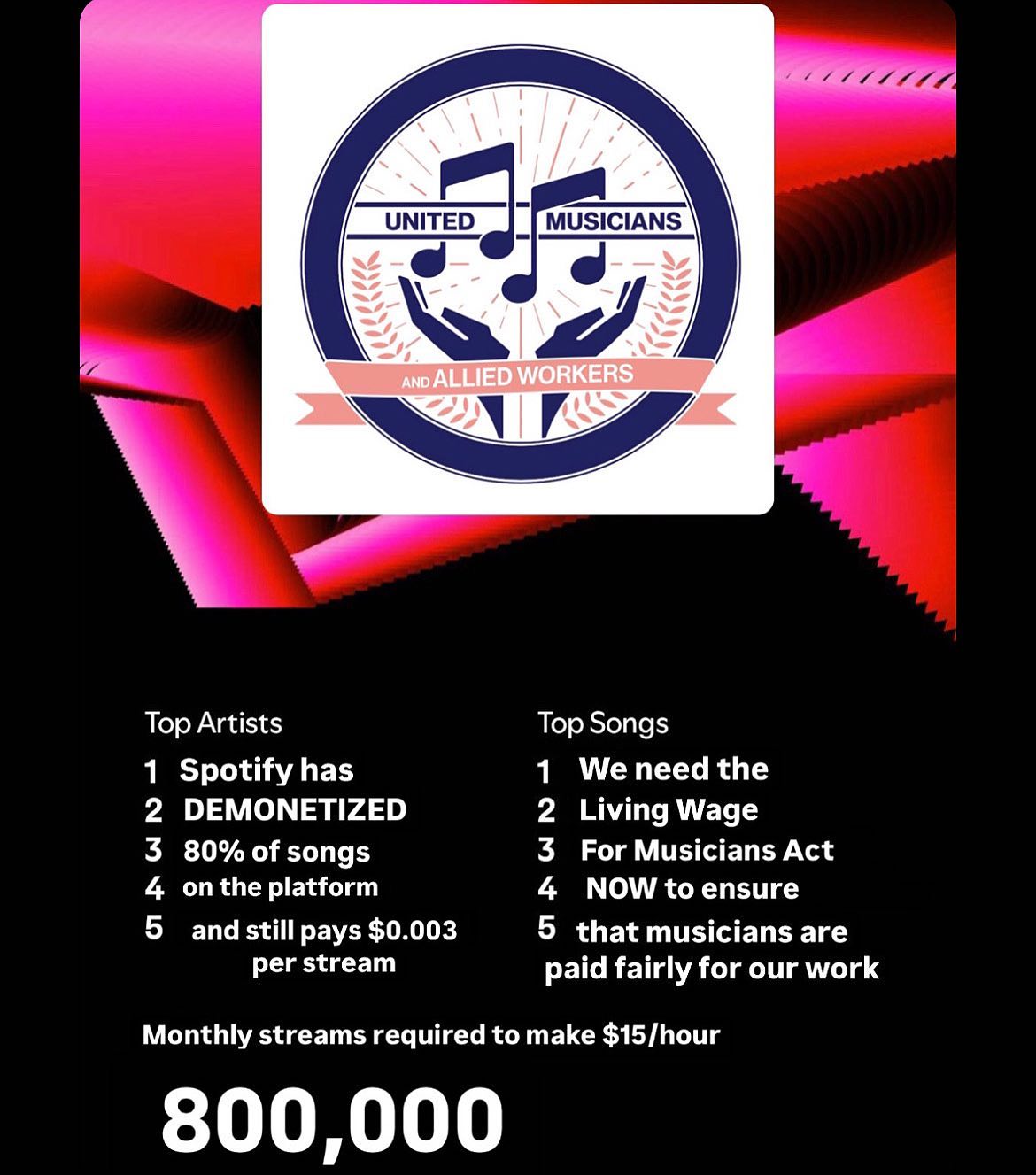
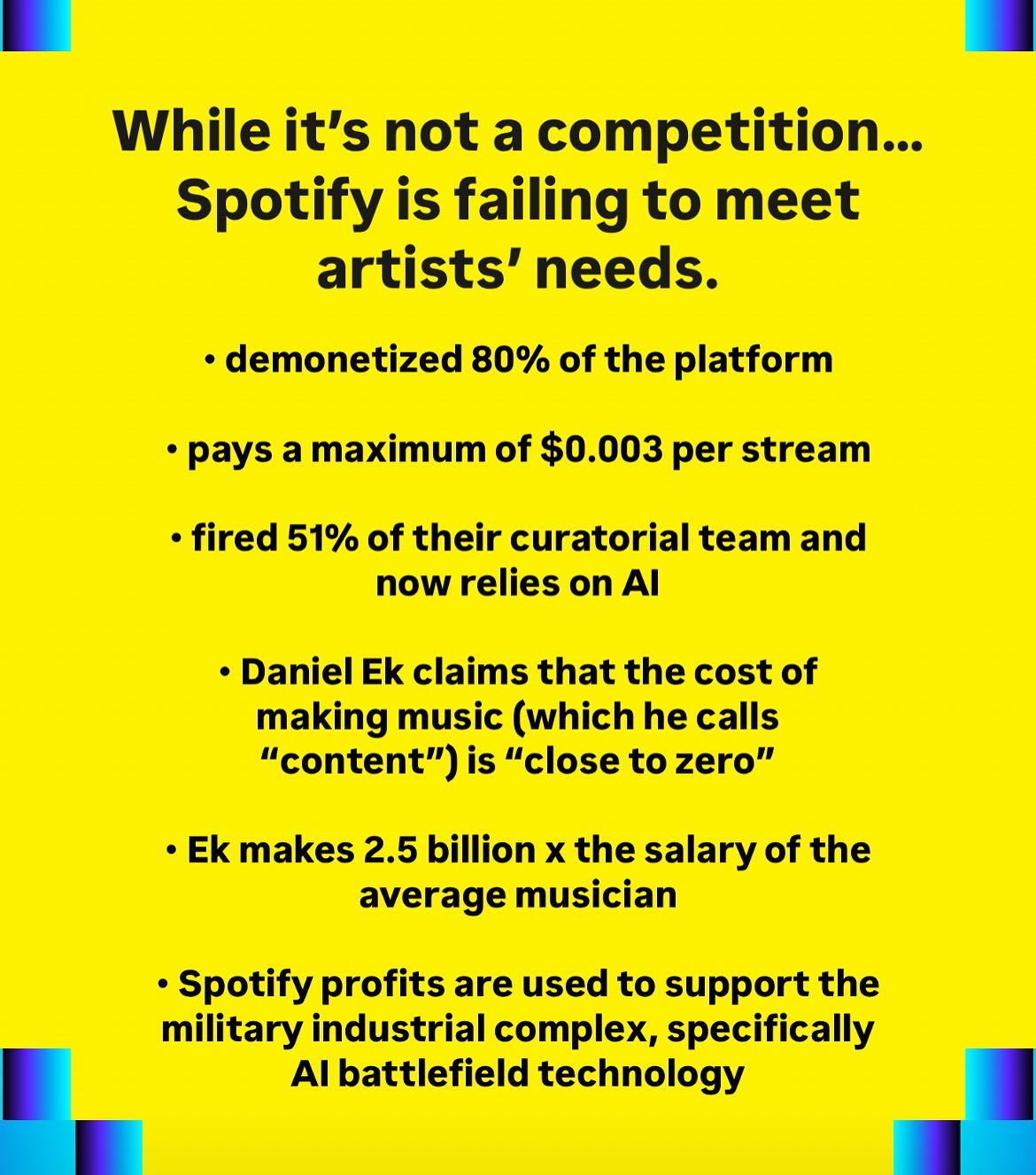
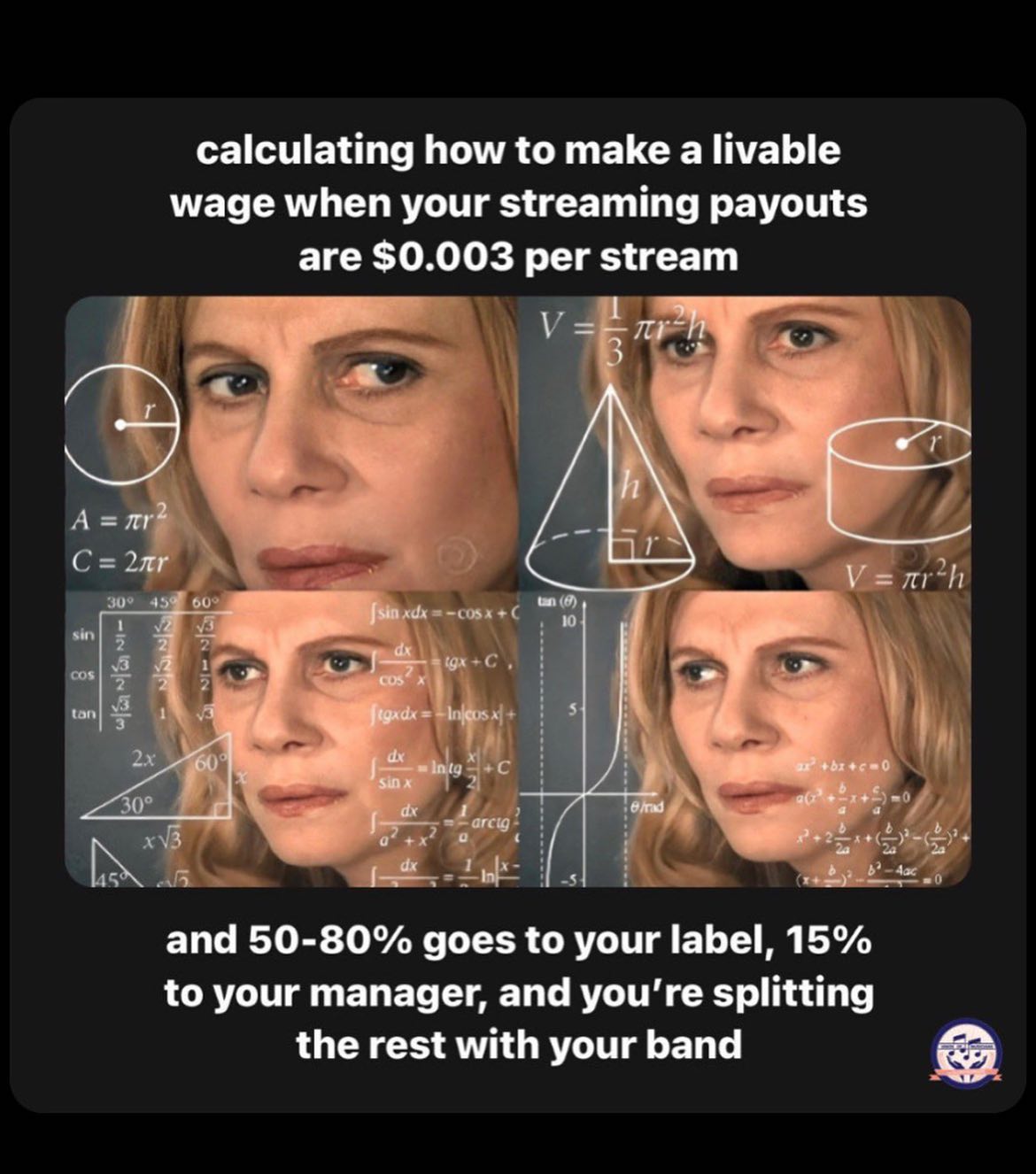
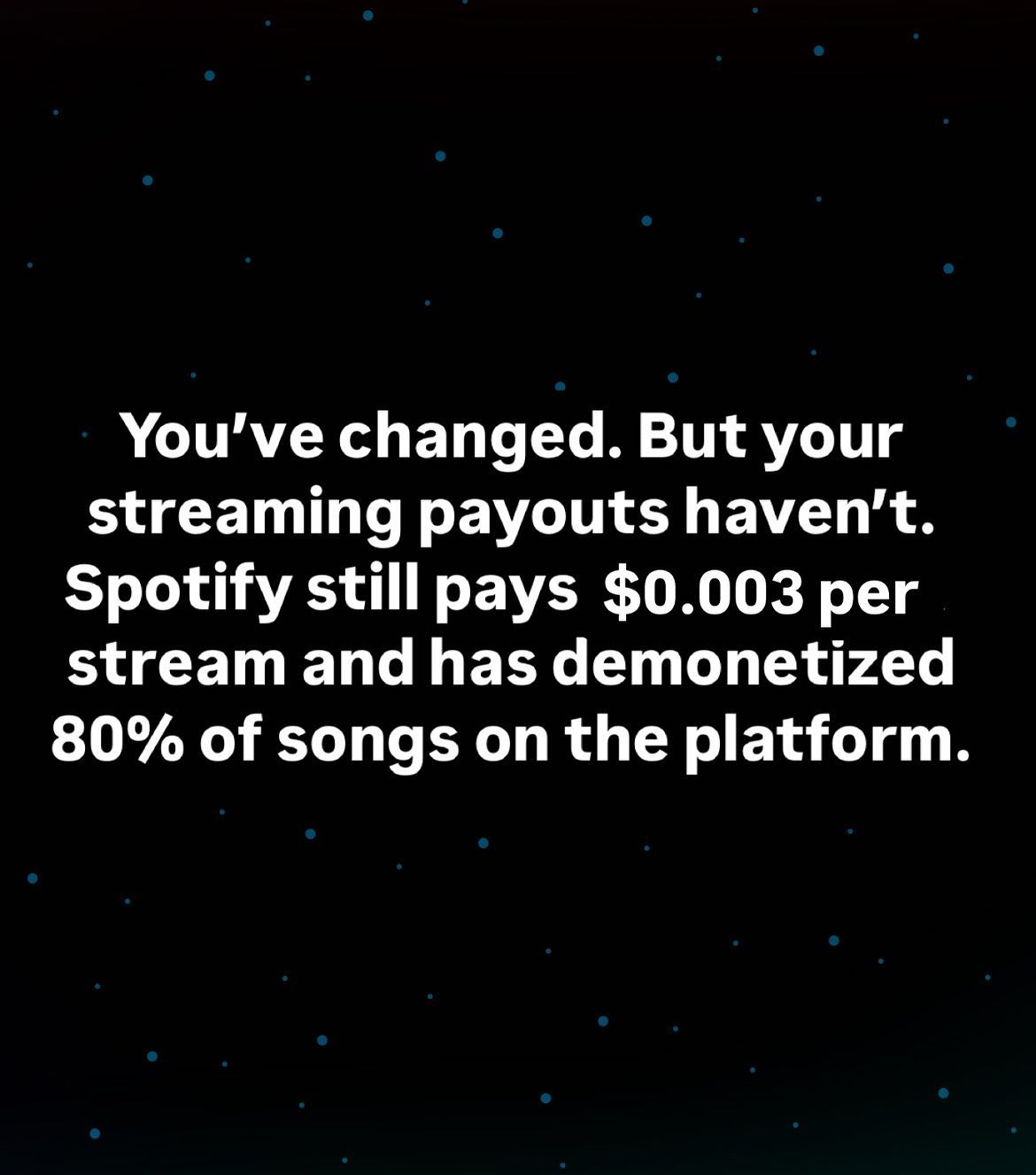
How were things with Spotify in 2023?
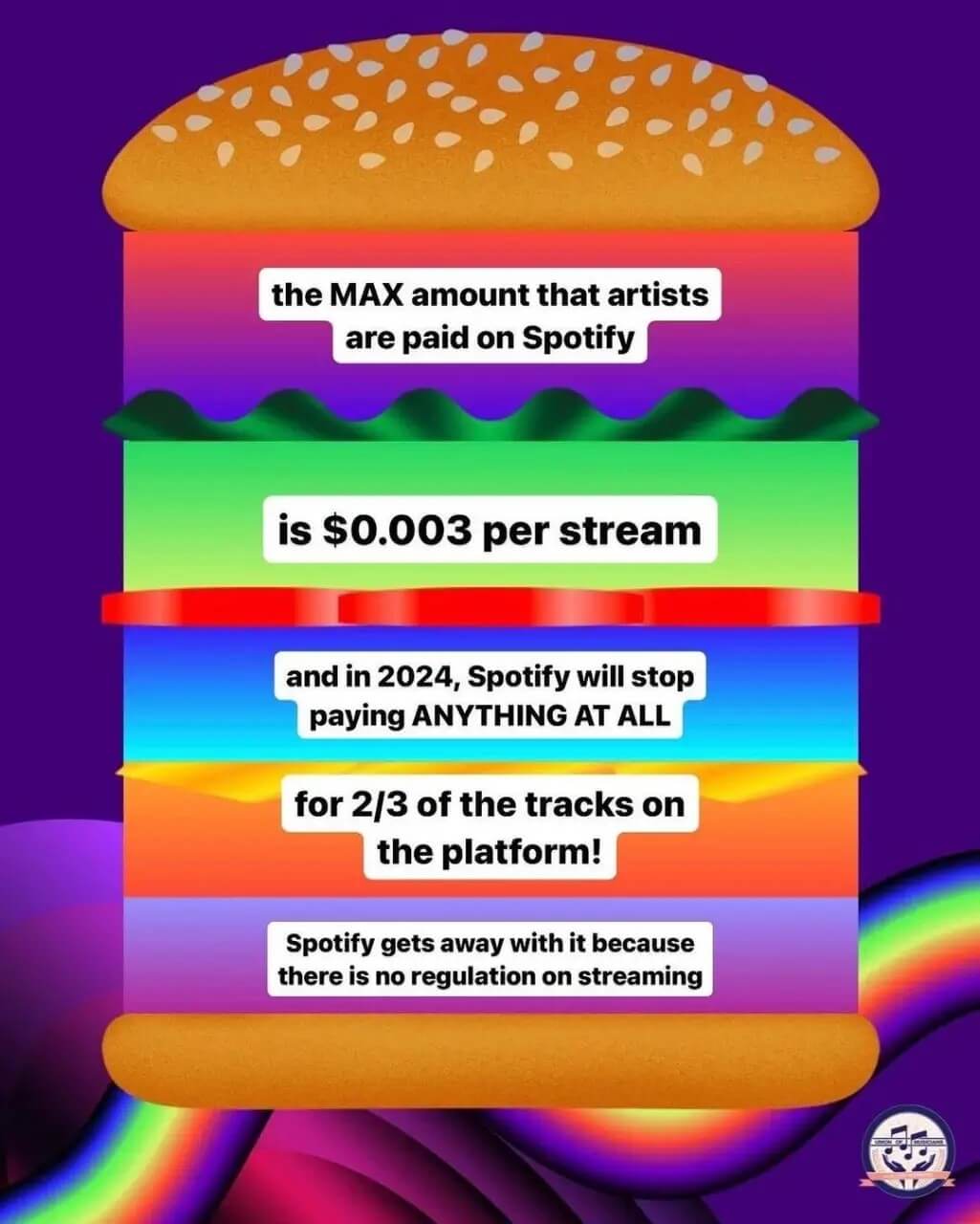
I've written a lot about Spotify over time. Here's a table of contents of the old content below:
- Fair pay for play
- Spotify supports a culture of transphobia, hypocrisy, and a culture of silence
- Spotify care about maximising profit and minimising artists
- ‘Is Spotify bad for music and musicians? The evidence is mounting’
- Spotify is a #BrokenRecord, alternatives exist
- Neil Young to Spotify: choose Joe Rogan’s podcast or my music
- Spotify vs intellectualism - yes to Joe Rogan, no to Neil Young
- Spotify wrapped is creepy, meaningless - and shows how much data big tech has on you
- 2024-12-19: Spotify created a shadow empire of music ghostwriters and sold out musicians even further (if that's possible)
Fair pay for play
I wrote the following In December 2018:
I just found out that an artist who is on Spotify and this year has had:
- 564k plays of their music
- 176k "fans"
- 39k hours of their music streamed
...gets a total of $13 USD for it.
Spotify isn't lying when it—after counting out those facts— writes "Thanks for an amazing year" to that artist.
I'd truly be amazed if Spotify would start to pay artists a fair dividend.
That's some time ago. Since then, Spotify have been engaged in different kinds of shady stuff, including lobbying to reduce songwriter pay[4]. Payouts are very different depending on whether you're a big artist that belongs to a big music label or if you make your music at home: an equal amount of streams won't equate to equal pay.
I wrote the following article in 2020:
Spotify supports a culture of transphobia, hypocrisy, and a culture of silence
What now, Spotify?
In a Spotify all-hands company meeting on Wednesday, Spotify CEO Daniel Ek defended keeping transphobic content from hugely popular podcaster Joe Rogan on the audio platform, who earlier this year signed an exclusive licensing deal with the company likely worth tens of millions of dollars.
@vice https://www.vice.com/en_us/article/xg8jq4/spotify-joe-rogan-transphobic
The Vice article that the above quote refers to is—quite the opposite of Spotify—very transparent about things. Funny, that; Spotify don't seem to like the prefix 'trans': trans people; transparency.
Spotify have tried to appear decent by deleting some of Joe Rogan's podcast episodes, notably those with the extremely damaging ultra-right-wing conspiracy nut Alex Jones and at least a couple of other far-right-wingers.
So, what is considered transphobic in Joe Rogan's recent podcast history?
The specific episode of the Joe Rogan Experience Ek was referring to was from July, in which Rogan interviewed Abigail Shrier, author of the book Irreversible Damage: The Transgender Craze Seducing Our Daughters, according to one of the sources. From the opening moments of that podcast, Shrier associates transgender youth with those with autism; Shrier and Rogan spend parts of the episode explaining that young people are being pressured into transitioning by YouTube and other media.
"You realize that people are not looking at this objectively," Rogan said in the podcast. "They are activists and they have this agenda, and the agenda is very ideologically driven that anybody who even thinks they might be trans should be trans, are trans, and the more trans people the better."
In the book, Shrier invalidates the lived experience of trans people by comparing transitioning to adolescent phenomena like eating disorders, self-harm, or the occult, according to Men's Health. She also described wanting to transition as a "contagion" with the potential to infect other children, an entirely scientifically baseless idea, Men's Health noted.
@vice https://www.vice.com/en_us/article/xg8jq4/spotify-joe-rogan-transphobic
In other words: Joe Rogan subscribes to the idea that trans people 'have this agenda' that is 'ideologically driven' and 'the more trans people the better'.
This is not only shit: it's damaging shit.
Remember: Spotify has most likely paid Joe Rogan tens of millions of US Dollars to exclusively host him on their platform.
Result: it's clear that Rogan is not only transphobic but also gives way to Abigail Shrier, an anti-intellectual person who believes gender dysphoria to be a disease. There you go. Simple to see.
What does Daniel Ek, CEO of Spotify, think of this?
"Others have concerns specifically over a recent episode," Ek said. "And Joe Rogan and the episode in question have been reviewed extensively. The fact that we aren't changing our position doesn't mean we aren't listening. It just means we made a different judgment call."
@vice https://www.vice.com/en_us/article/xg8jq4/spotify-joe-rogan-transphobic
Let me rephrase what Daniel Ek is saying:
'The fact that we aren't changing our position means that we support Joe Rogan in broadcasting his anti-intellectual, abusive, and damaging stance. Trans people are constantly at threat. We amplify Rogan with both money, technology, and advertisements.'
To Spotify, 'listening' means acting without ethics or morals. It's quite the illusory stance to make considering how listening is what, ultimately, makes them money.
What if we play by Spotify's rules?
"At Spotify, we are strongly committed to the LGBTQ+ community and diversity in all of its forms," a Spotify spokesperson told Motherboard. "All employees are respected and we believe that everyone has a right to be heard. We have a number of forums for open and transparent discussion and we encourage rigorous debate on topics across the company. All content on Spotify is subject to our long-standing content guidelines. Our diverse team of experts reviewed the content in question and determined that it did not meet the criteria for removal from our platform."
@vice https://www.vice.com/en_us/article/xg8jq4/spotify-joe-rogan-transphobic
What does Spotify's content guidelines have to say about this?
Hate content is content that expressly and principally promotes, advocates, or incites hatred or violence against a group or individual based on characteristics, including, race, religion, gender identity, sex, ethnicity, nationality, sexual orientation, veteran status, or disability. We do not permit hate content on Spotify. When we are alerted to content that violates this standard, we will remove it from the platform. If you believe a piece of content violates our hate content policy, complete the form here and we will carefully review it against our policy. We are also continuing to develop and implement content monitoring technology which identifies content on our service that has been flagged as hate content on specific international registers.
Repeated violations of our prohibited content policies can result in losing access to the Spotify platform.
@spotifyartists https://artists.spotify.com/faq/music#what-content-is-prohibited-on-spotify
Let's break this down by asking what hate is. Here is one of Merriam-Webster's definitions of hate:
intense hostility and aversion usually deriving from fear, anger, or sense of injury
@MerriamWebster https://www.merriam-webster.com/dictionary/hate
- Hostility: deep-seated ill will
- Aversion: a feeling of repugnance toward something with a desire to avoid or turn from it
Wait: one aggrievance surely isn't enough to say somebody's hateful, right? Sadly, Joe Rogan has been transphobic in the recent past:
Joe Rogan has given people like this access to his gigantic audience, and Rogan rarely challenges his guests on their views, allowing them to launder their bad ideas on his show. Data & Society researcher Becca Lewis has argued that Rogan giving a platform to these people has led his audience down more extremist rabbit holes on YouTube. Lewis describes Rogan as a libertarian influencer "with mainstream appeal."
In another recent episode, Rogan explained a joke he made in 2016 about Caitlyn Jenner's transition, describing Jenner as "he" and using her deadname "Bruce." Rogan also mischaracterized the reason for Jenner's transition, saying it may have been because she was around her daughters Kylie Jenner and Kendall Jenner, that he describes as "crazy bitches."
"He's a homophobic, transphobic ass," Jenner told TMZ this week. "I've been gender disphoric my entire life."
As recently as August 31, in what he said was the first episode of the podcast for Spotify, Rogan joked that the Democratic party "just want to talk shit and make sure everyone is trans." He followed that up by saying "I don't mean that trans people, I'm with you." He also said that "my only pushback is about trans people competing as females in fighting." Rogan is a UFC commentator, and was referring to his long standing objection to trans women fighting other women in MMA.
@vice https://www.vice.com/en_us/article/xg8jq4/spotify-joe-rogan-transphobic
Obviously, Joe Rogan has displayed hate against trans people. What will Spotify do about this?
If you ask Daniel Ek, they 'make a different judgement call', which shows Spotify for what they are. This is from their own guidelines:
Repeated violations of our prohibited content policies can result in losing access to the Spotify platform.
@spotifyartists https://artists.spotify.com/faq/music#what-content-is-prohibited-on-spotify
This is not about making a 'judgement call'; this is a company that acts like it works via ethics and does not; this is a capitalist company that hurts both the people who make them money—musicians—and the people who pay money to Spotify.
Remember, just 1.5 years ago, Spotify tried to reduce royalty payouts to artists by a third of what they made until then.
I hope more material leaks from Spotify on this, simply because:
At the meeting, Ek also told employees not to leak to the media, noting "If we can't have open, confidential debates, we will have to move those discussions to closed doors."
@vice https://www.vice.com/en_us/article/xg8jq4/spotify-joe-rogan-transphobic
Do you work at Spotify? We'd love to hear from you. Using a non-work phone or computer, you can contact Joseph Cox securely on Signal on +44 20 8133 5190, Wickr on josephcox, OTR chat on jfcox@jabber.ccc.de, or email joseph.cox@vice.com.
@vice https://www.vice.com/en_us/article/xg8jq4/spotify-joe-rogan-transphobic
I wrote the following in November 2020:
Spotify care about maximising profit and minimising artists
From The Fader:
Spotify has announced a new feature for artists and labels seeking to increase exposure. In a press release issued November 2, the digital streaming platform unveiled a new function that will allow creators at all levels to boost their visibility through Spotify's algorithmic music selector that the app defaults to on the radio and autoplay functions.
Will artists have to pay to get their music to the 'top'? You bet:
While Spotify notes that the feature won't require any immediate upfront costs, it will only be available in exchange for lowered royalty payments: "Labels or rights holders agree to be paid a promotional recording royalty rate for streams in personalized listening sessions where we provided this service." Furthermore, the press release adds that accepting these new terms "won’t guarantee placement to labels or artists."
So, while Spotify lobby to reduce songwriter royalties by a third, they want musicians to pay to play. Payola, in other words, is what it boils down to. All of this while tracking user interactions and experiences via their apps, and using that data to predict how to best manipulate and sell user behaviour.
This is disgusting surveillance capitalism.
Also:
Just last week, over 4,000 independent artists in the Union of Musicians and Allied Workers presented a new campaign demanding that Spotify pay at least one cent per stream, among other requests for a more equitable streaming environment. "Music workers create all of the enormous wealth Spotify accumulates for its CEO, its investors, and the major labels," the Union wrote in an open letter. "But we artists continue to be underpaid, misled, and otherwise exploited by the company."
...and:
Here’s Spotify’s topline third quarter results:• Total revenue grew 14% Y/Y to €1.97 billion ($2.29 billion)
• Total monthly active users (MAUs) rose to 320 million, up 29% Y/Y, exceeding company expectations
• Premium subscribers are up to 144 million, generating €1.79 billion ($2.08 billion)
• Ad-supported sales bounced back to €185 million, up 41% on Q2 at the height of the pandemic
One day, the truth about Daniel Ek will out.
I wrote this in December 2020:
‘Is Spotify bad for music and musicians? The evidence is mounting’
April 2020, according to Tom Gray.
tl;dr: yes. Read this article, from where the quotes below are taken. Also, read the twitter rollup at the end to understand how dire things are for musicians. I hope sites like Resonate get going. Bandcamp are good.
The debate about whether musicians are treated fairly by streaming services such as Spotify took a dark and worrying twist today when the head of an influential House of Commons committee warned the music industry against interfering with witnesses in an ongoing inquiry.
Julian Knight, the MP who chairs the Digital, Culture, Media and Sport Committee which is investigating the economics of music streaming, took the rare step of issuing a public statement to warn the industry off. His intervention follows comments at an evidence session last week by singer Nadine Shah that many musicians are “scared to speak out” because they don’t want to “lose favour” with all-powerful streaming services and record labels.
@TeleMusic https://www.telegraph.co.uk/music/news/spotify-bad-music-musicians-evidence-mounting/
This is why what happens in the House of Commons matters. Last week Radiohead’s Ed O’Brien, Elbow’s Guy Garvey and Gomez’s Tom Gray gave evidence alongside Shah. Gray’s Broken Record campaign aims to fight for fairer terms for artists. “People don’t seem to realise how high-stakes this is for artists,” someone close to the inquiry tells me. If the committee recommends that changes are needed in the way the industry operates, the Government will be expected to respond and could legislate.
@TeleMusic https://www.telegraph.co.uk/music/news/spotify-bad-music-musicians-evidence-mounting/
On the calculation mentioned above, Bad Bunny’s billions of streams would have netted the vocalist the equivalent of £332 million. But not everyone is as lucky. Far from it. Over half of the 50,000 professional musicians in the UK are estimated to earn under £20,000 a year. Across Europe, the average annual amount of money made by an artist from streaming is around £900, the Commons heard last week.
@TeleMusic https://www.telegraph.co.uk/music/news/spotify-bad-music-musicians-evidence-mounting/
Elbow’s Garvey gave a typically level-headed assessment of the situation in the Commons last week. Streaming, he said, is a “wonderful thing”. However it hasn’t been properly thought through. There “has been a land grab and it has been clumsy”, Garvey said. He doesn’t want generations to come to lose the ability to make art.
@TeleMusic https://www.telegraph.co.uk/music/news/spotify-bad-music-musicians-evidence-mounting/
https://twitter.com/MrTomGray/status/1249290407088881675
https://threadreaderapp.com/thread/1249290407088881675.html
The same month I wrote:
Spotify is a #BrokenRecord, alternatives exist
Bear in mind that it takes circa 230 Spotify streams to make 1 US Dollar.
Approximately 280,000 streams to pay the average apartment rent in the USA.
Nadine Shah is a Mercury Prize-nominated musician. She's over 100,000 monthly Spotify listeners. She's alright, right?
Right?
I was foolish. The situation was such that I temporarily had to move back in with my parents over the summer. Not the worst thing to happen, but still not a great look for a thirtysomething pop star. Like most of my musician friends who rely on gigs, I found myself in dire straits. (If only I actually were in Dire Straits.)
Streaming only really works for superstars and super record labels. Instead of receiving a direct amount per sale, as with downloads or physical purchases, it’s a “winner-takes-all” system. The way it works is the combined revenue of every streaming subscriber is divided by by “market share”. For example, suppose Bruno Mars releases an album and – rightly, because he’s amazing – Bruno appears on the surface of every phone, on every playlist, pushed by every algorithm. He could potentially end up with 5% of the whole world’s streaming money. Or, to be accurate, his record label will pocket that 5%. Bruno might see about 20% of that if, and only if, he’s repaid his recording costs. Pre-digital artists may be on pre-digital deals, so they may see nothing.
Even before Covid, the major labels were making almost $20m a day from streaming. And this year has seen a a huge increase in streaming subscriptions, as fans turn to platforms such as Apple Music and Spotify to help ease their locked-down minds. The three major music groups, Sony, Warner and Universal own about three-quarters of the music ever made so, by this system, they’ll pocket about three-quarters of streaming revenue every month. Independent or self-releasing artists share the rest.
The above is from this article that is published today. Read more:
Musicians are revolting. They’re rising up around the world to draw attention to the microscopic earnings they make from streaming. Songwriters, artists, players and producers of every kind have started scrutinising the industry, calling for reform, transparency, fairness and rights. It’s dead exciting.
Musicians fear reprisals for speaking to MPs' streaming inquiryRead more
There's also this:
On October 26, the Union of Musicians and Allied Workers launched an initiative called Justice at Spotify, publishing a detailed list of demands with the goal of making streaming fairer for artists, labels, and rights holders. The main points can be boiled down to three. First, they're asking the streaming giant to pay out at least a penny per stream, which is about three times the $.0038 payout artists receive on average for their music. Second, they are demanding greater financial transparency from the company, including around its contracts with major labels, distributors, and management companies. Lastly, they want Spotify to put an end to its legal battles over royalty rates, which the union describes as being "intended to further impoverish artists." Justice at Spotify follows 2020 initiatives in the U.K. like the #KeepMusicAlive and the #BrokenRecord campaign, which looks at inequities in record label and licensing deals on top of streaming.
So far, over 18,000 musicians have signed the U.M.A.W's letter, which arrives as artists continue to struggle with the economic fallout of COVID-19. But as grassroots support for U.M.A.W.'s initiative soars, Spotify has yet to address or respond to the union's concerns. Since U.M.A.W. posted its demands, the company sparked criticism when it announced a new feature enabling musicians to promote their songs on algorithmically generated personalized playlists; in exchange for the service, rights holders would be paid at a lower royalty rate. And just this week, amid revelations that Spotify had lost over $500 million since the start of the year, it announced that it was purchasing podcast ad-tech company Megaphone for a whopping $235 million. VICE reached out to Spotify but did not get an on-record comment about the union's demands.
@vice https://www.vice.com/en/article/k7awev/union-of-musicians-want-penny-per-stream-from-spotify
So, what to do?
What can we do to fix it? Last week, I appeared beside Guy Garvey of Elbow, Ed O’Brien of Radiohead and Tom Gray of Gomez, to give evidence in front of the DCMS inquiry. It was terrifying. Music and politics rarely come face to face. Musicians are supposed to rail against politicians, not testify in front of them. But now we’re asking the government to intervene and correct the streaming market where it’s failing.
Guy, Ed, Tom and I suggested the government grant musicians rights to income from streaming, so they can earn a percentage from every stream regardless of the system. The same is already true of TV and radio broadcasts, so it’s hardly a revolutionary idea. It works well. The government could also look into the market dominance of the major music companies.
There are solutions.
Look into other streaming platforms:
I love both of those.
Today, I rediscovered Datach'i via Resonate, then bought his latest album via Bandcamp; I could pay it for any price above £7. I can now stream it whenever I want, can download it whenever I want in a variety of formats, play it without fear of it being removed from a streaming platform whenever I want.
And I'm not giving money to transphobic and musican-hating platforms.
Thanks, Resonate and Bandcamp.
Money goes directly to the label, the artist, and the kind platforms.
Must say, I dig how Resonate's playing works:
Our unique Stream2own model splits the cost of a digital download into 9 plays.
Plays start off cheap when you're discovering and as you fall in love with a song, you come to pay the full price.
There's no transition out of Resonate to buy a song or album. Purchase it directly, or just keep listening.
Resonate pays artists directly and per-play. For listeners, the overall cost is similar to that of the average monthly streaming subscription.
@resonatecoop https://resonate.is/stream2own/
Check their manifesto.
Let the music play.
in January 2022 I wrote this:
Neil Young to Spotify: choose Joe Rogan’s podcast or my music
Spotify supports Joe Rogan’s transphobia by allowing it to continue, in spite of their own guidelines, which should most likely Joe Rogan’s podcast from Spotify.
Since then, Rogan has started to spout antivax idiocies.
I don't expect Spotify to eject Rogan, their enormous cash cow, who they're paying somewhere in the realm of tens of millions of USD for exclusive access to his show.
Spotify vs intellectualism - yes to Joe Rogan, no to Neil Young
I recently wrote about how Neil Young said Spotify had to choose between serving his music or Joe Rogan's transphobic, antivax, and anti-Spotify-guideline podcast.
From this open letter to Spotify, courtesy of hundreds of doctors, professors, healthcare workers, and other medical professionals:
Throughout the COVID-19 pandemic, Joe Rogan has repeatedly spread misleading and false claims on his podcast, provoking distrust in science and medicine. He has discouraged vaccination in young people and children, incorrectly claimed that mRNA vaccines are “gene therapy,” promoted off-label use of ivermectin to treat COVID-19 (contrary to FDA warnings), and spread a number of unsubstantiated conspiracy theories. In episode #1757, Rogan hosted Dr. Robert Malone, who was suspended from Twitter for spreading misinformation about COVID-19. Dr. Malone used the JRE platform to further promote numerous baseless claims, including several falsehoods about COVID-19 vaccines and an unfounded theory that societal leaders have “hypnotized” the public. Many of these statements have already been discredited. Notably, Dr. Malone is one of two recent JRE guests who has compared pandemic policies to the Holocaust. These actions are not only objectionable and offensive, but also medically and culturally dangerous.
The average age of JRE listeners is 24 years old and according to data from Washington State, unvaccinated 12-34 year olds are 12 times more likely to be hospitalized with COVID than those who are fully vaccinated. Dr. Malone’s interview has reached many tens of millions of listeners vulnerable to predatory medical misinformation. Mass-misinformation events of this scale have extraordinarily dangerous ramifications. As scientists, we face backlash and resistance as the public grows to distrust our research and expertise. As educators and science communicators, we are tasked with repairing the public’s damaged understanding of science and medicine. As physicians, we bear the arduous weight of a pandemic that has stretched our medical systems to their limits and only stands to be exacerbated by the anti-vaccination sentiment woven into this and other episodes of Rogan’s podcast.
This is not only a scientific or medical concern; it is a sociological issue of devastating proportions and Spotify is responsible for allowing this activity to thrive on its platform. We, the undersigned doctors, nurses, scientists, and educators thus call on Spotify to immediately establish a clear and public policy to moderate misinformation on its platform.
https://spotifyopenletter.wordpress.com/2022/01/10/an-open-letter-to-spotify/
Young's words ring true:
Young posted an update today thanking Warner. "I want to thank my truly great and supportive record company Warner Brothers-Reprise Records, for standing with me in my decision to pull all my music from Spotify. Thank You!" Young wrote. Young said this is "a huge loss for my record company to absorb" given that "Spotify represents 60 percent of the streaming of my music to listeners around the world."
"I could not continue to support Spotify's life-threatening misinformation to the music loving public... Spotify has become the home of life-threatening COVID misinformation. Lies being sold for money," Young also wrote.
Young wrote that before he went public about wanting his music off Spotify, "I was reminded by my own legal forces that, contractually, I did not have the control of my music to do that. I announced I was leaving anyway because I knew I was. I was prepared to do all I could and more just to make sure that happened."
Young, a long-time proponent of high-resolution music files, also wrote that "many other platforms, Amazon, Apple, and Qobuz, to name a few, present my music today in all its High-Resolution glory—the way it is intended to be heard, while unfortunately Spotify continues to peddle the lowest quality in music reproduction. So much for art."
Now, take in the quotes above. Then, take a deep breath and wear a mental gasmask against Spotify's statement:
We want all the world’s music and audio content to be available to Spotify users. With that comes great responsibility in balancing both safety for listeners and freedom for creators. We have detailed content policies in place and we’ve removed over 20,000 podcast episodes related to COVID since the start of the pandemic. We regret Neil’s decision to remove his music from Spotify, but hope to welcome him back soon.
Dominic Patten https://deadline.com/2022/01/neil-young-leaving-spotify-joe-rogan-covid-vaccines-1234920496/
In essence, Spotify say this:
- They've removed thousands of podcast episodes related to COVID-19, but they don't say why they're removed
- They're indirectly (and cowardly) saying they're keeping Rogan's podcast in spite of its content
A final summation of their words: 'We've removed some non-Joe-Rogan's-podcast-COVID-19-related podcast episodes, not because of what they contain, so we're not saying why we removed those episodes. We don't care about adhering to our own guidelines nor about anything other than money because we've spent many millions of dollars to have Joe Rogan's podcast be exclusively on Spotify. We're anti-intellectuals and will likely continue to break our own guidelines or just scrap them. Who cares.'
Thanks, Neil Young, for speaking out against Spotify.
As Noam Chomsky has said, it is the responsibility of intellectuals to speak the truth and to expose lies.
Spotify are liars who only care about money. Would you be friends with Spotify if the company were a human being?
Spotify wrapped is creepy, meaningless - and shows how much data big tech has on you
Spotify wrapped is creepy, meaningless - and shows how much data big tech has on you
There’s something faintly creepy lurking behind Spotify Wrapped’s rainbow-hued graphics. At heart, its message is that something, somewhere is effectively spying on you, carefully taking note of everything you listen to and when – and it’s also a reminder of how many other companies are doing the same without actually presenting their findings back to you.
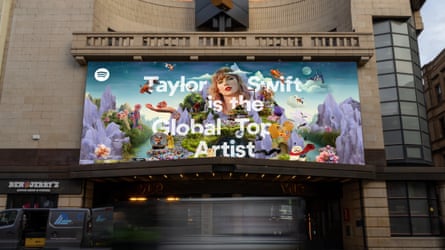
An advert announcing that Taylor Swift is Spotify’s most-streamed artist in 2023. Photograph: Spotify
The efficacy of the data involved in actually discerning your favourite music is also questionable. It obviously favours anything released earlier in the year than later, simply because you’ve had more opportunity to listen to it. Moreover, I can tell you for a fact that the figures can be inadvertently massaged. The artist Spotify Wrapped claims is my most listened-to in 2023 is someone I’ve barely given a thought to this year (and I will therefore respectfully veil): their place at the top of the pile tells you nothing about my regular listening habits and everything about the night I came back from a convivial evening at the pub, was gripped with a sudden, beer-fuelled desire to hear a track I hadn’t played in years, then immediately fell asleep with my headphones on, thus obliviously “listening” to it over and over again for eight hours.
Those kind of mishaps aside, you might even query the point of the whole exercise. Why on earth do you need to be told who your most listened-to artists of the year are? You’d presumably know already, on account of the fact that you’ve been listening to them a lot. That the results can feel bafflingly wrong speaks to the semi-detached engagement with music engendered by Spotify’s all-you-can-eat smorgasbord approach. Presented with so much, you’re inclined to nibble a bit of this, and then a bit of that: you’re less inclined to listen to full albums, or even tracks all the way through. Overwhelmed by choice you might fall back on on stuff you already know, or throw yourself on the mercy of of curated, tightly genre-specific playlists designed to unspool unobtrusively in the background and by algorithms that throw up things that sound like stuff you’ve already heard – none of it really reflecting your true musical loves. It’s hard to argue with the news that the most-streamed artist of 2023 is Taylor Swift – well, of course it is, she’s been omnipresent all year – but perhaps Spotify Wrapped’s very existence tells you rather less about music itself than streaming’s effect on it.
2024-12-19: Spotify created a shadow empire of music ghostwriters and sold out musicians even further (if that's possible)
Liz Pelly, the author of the coming book Mood Machine: the Rise of Spotify and the Costs of the Perfect Playlist, has written an article named The Ghosts in the Machine[5] that deals with the fact that Spotify has engaged with firms that hire songwriters to write music for one-off payments. The songs are then owned by the firms and licensed to Spotify for use in their most-played playlists:
Spotify, the rumor had it, was filling its most popular playlists with stock music attributed to pseudonymous musicians—variously called ghost or fake artists—presumably in an effort to reduce its royalty payouts. Some even speculated that Spotify might be making the tracks itself.
This is what Pelly heard back in 2017.
Before the year was out, the music writer David Turner had used analytics data to illustrate how Spotify’s “Ambient Chill” playlist had largely been wiped of well-known artists like Brian Eno, Bibio, and Jon Hopkins, whose music was replaced by tracks from Epidemic Sound, a Swedish company that offers a subscription-based library of production music—the kind of stock material often used in the background of advertisements, TV programs, and assorted video content.
Then, in 2022, an investigation by the Swedish daily Dagens Nyheter revived the allegations. By comparing streaming data against documents retrieved from the Swedish copyright collection society STIM, the newspaper revealed that around twenty songwriters were behind the work of more than five hundred “artists,” and that thousands of their tracks were on Spotify and had been streamed millions of times.
Pelly's article shows not only how Spotify are further shafting musicians and music labels, but are using AI to make music and to change people's perception of music; just as the company Niantic used their game Pokémon Go to build an AI navigation system[6], Spotify want to gear users to simply run a playlist and don't care about the contents, never mind the artists.
Spotify, I discovered, not only has partnerships with a web of production companies, which, as one former employee put it, provide Spotify with “music we benefited from financially,” but also a team of employees working to seed these tracks on playlists across the platform. In doing so, they are effectively working to grow the percentage of total streams of music that is cheaper for the platform. The program’s name: Perfect Fit Content (PFC).
This is far beyond the old payola concept, this is even beyond dark patterns; this is retraining users to listen to 'emotional wallpaper' and train them to get used to it.
For example: ‘Songs on Spotify Will Need 1,000 Streams to Make Royalties from 2024’, DJMag.com, 7 November 2023, https://djmag.com/news/songs-spotify-will-need-1000-streams-make-royalties-2024. ↩︎
Laura Snapes, ‘Spotify to Phase out Service in Uruguay Following New Copyright Bill Requiring “Fair and Equitable Remuneration”’, The Guardian, 21 November 2023, sec. Music, https://www.theguardian.com/music/2023/nov/21/spotify-to-phase-out-service-in-uruguay-following-new-copyright-bill-requiring-fair-and-equitable-remuneration. ↩︎
Alexis Petridis, ‘Spotify Wrapped Is Creepy, Meaningless – and Shows Just How Much Data Big Tech Has on You’, The Guardian, 30 November 2023, sec. Music, https://www.theguardian.com/music/2023/nov/30/spotify-wrapped-is-creepy-meaningless-and-shows-just-how-much-data-big-tech-has-on-you. ↩︎
‘Songwriters of North America Hit Back at Spotify CRB Appeal’, Music Business Worldwide, 11 March 2019, https://www.musicbusinessworldwide.com/sona-hits-back-at-spotify-crb-appeal/. ↩︎
Pelly, Liz. “The Ghosts in the Machine.” Harper’s Magazine, December 18, 2024. Accessed December 20, 2024. https://harpers.org/archive/2025/01/the-ghosts-in-the-machine-liz-pelly-spotify-musicians/. ↩︎
Edwards, Benj. “Niantic Uses Pokémon Go Player Data to Build AI Navigation System.” Ars Technica. Last modified November 19, 2024. Accessed December 20, 2024. https://arstechnica.com/ai/2024/11/niantic-uses-pokemon-go-player-data-to-build-ai-navigation-system/. ↩︎